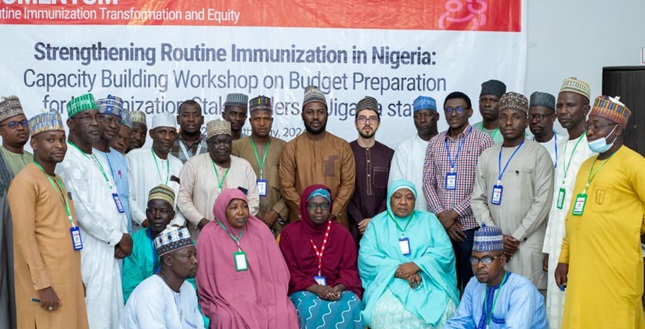The Jigawa state government in collaboration with the ‘MOMENTUM’ Routine Immunization Transformation and Equity project (M-RITE) embarked on training of local government councils’ personnel on effective and modern processes for budget preparation and annual inclusion of routine immunization at the local council’s level.
The training holding at M-Town Hotel in Dutse the state capital sponsored by the United States Agency for International Development (USAID) and managed by JSI Research and Training Institute, Inc., along with several implementing partners – R4D, led a capacity-building activity designed to enhance the prioritization of immunization delivery costs in both LGA and state budgets.
This initiative aims to improve the change agents’ skills in developing evidence-based budgeting that would facilitate the mobilisation of resources at the local government level to support routine immunisation service delivery and help address critical barriers to the effective uptake of routine immunization.
Speaking while declaring the training open, the acting Permanent Secretary of the Ministry of Budget and Economic Planning, Alhaji Auwalu Bello, said the training is aimed at proving the participants’ skills and inculcating modern techniques on budget preparation for routine immunization at local government levels
Bello explained that participants would be given an in-depth understanding of the state budget cycle and trained on the various stages of health budgeting, including preparation, approval, execution, and evaluation.
According to him, “The objective is to empower participants to advocate for the inclusion of routine immunization in local government budgets by mastering the budget processes”.
This effort aims to improve immunization services and boost coverage among zero-dose and under-immunized children.
ALSO READ: Gov Namadi seeks FG’s intervention to save Jigawa dry season rice farmers
In his part, the Senior Program Officer from R4D, Jose Gonzalez, stated that the objective of the workshop is for participants to understand the budget preparation processes and their roles within each phase of the budget cycle.
Jose Gonzalez added that this will strengthen their ability to create compelling budgets for routine immunization and budget request memos, ultimately increasing local-level financial ownership of routine immunization services.
Also speaking Arowolo Ayoola, the consultant leading the activity in Jigawa state emphasized that the training aimed to provide practical solutions and enhance the skills of healthcare workers, thus improving the uptake of routine immunization in Jigawa.
Usman Ahmed, Deputy Director of the Department of Planning Research and Statistics at the Ministry of Health also tutored participants on healthcare financing and the necessity of domestic resource mobilization for routine immunization to address child mortality.
Participants at the training, including PHC managers, Directors of Administrative and General Services (DAGS), Local Government Immunization Officers (LIO), and Routine Immunization Officers (RIOs), discussed the barriers to mobilizing domestic funding for routine immunization at the local government level.
They proposed solutions and action points to increase the prioritization of routine immunization activities in local government areas through proper and timely budget preparation.






